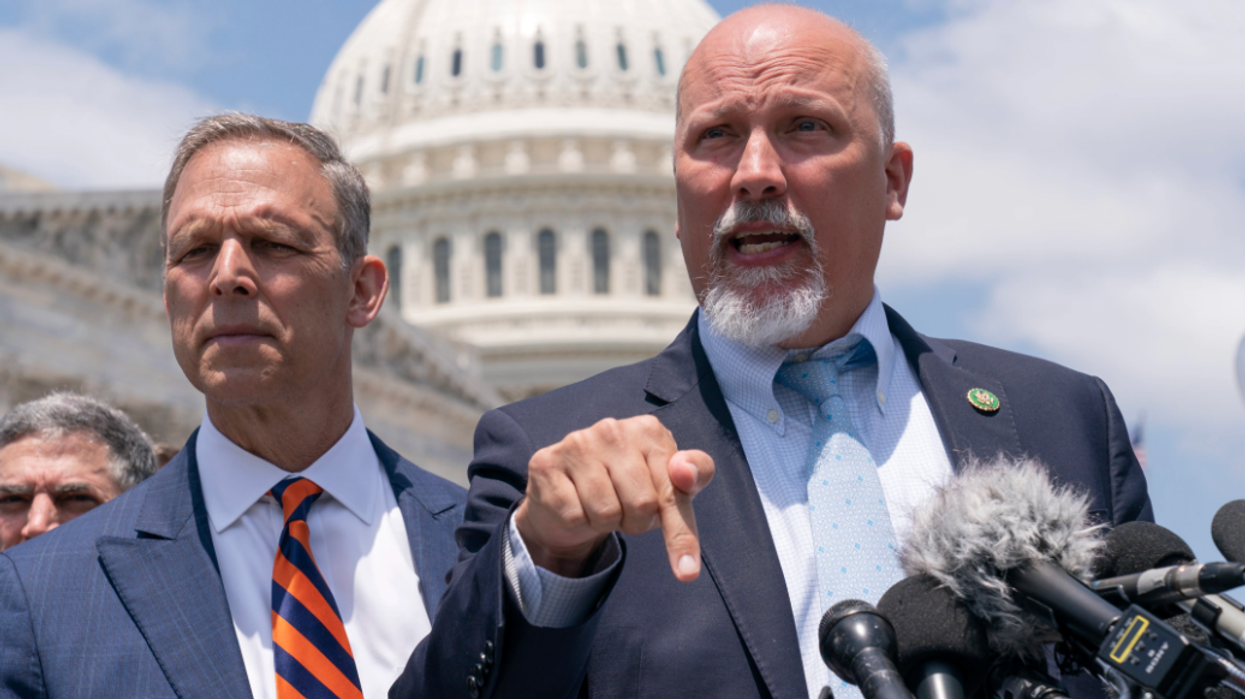
Rep. Scott Perry, House Freedom Caucus chair, left, and Rep. Chip Roy
The deal President Joe Biden made with House Speaker Kevin McCarthy takes the debt ceiling off the table until January 1, 2025, the remainder of Biden’s current term in the White House. No wonder the Freedom Caucus is so wound up about it! The debt ceiling is the best political hostage ever, even if some of those caucus members seem to question whether default or its consequences are actually real. The other thing the bill does, though you’re not seeing a lot of uproar from the Freedom Caucus maniacs about it yet, is make a potential government shutdown much more politically painful for Republicans. McCarthy might have just negotiated a lot of Republican potency away.
One of the key things the agreement does is disincentivize the other hostage-taking action that Republicans love: holding up funding in order to shut the government down. The deal has a trigger mechanism that ensures that if Republicans do try to shut the government down, they end up making cuts to the thing they love most, next to tax cuts for rich people—defense spending. A shutdown would also force automatic cuts to veterans’ health care, the other thing Republicans have insisted is most important to them since Democrats pointed out just how much they would have taken away from veterans with their original debt ceiling offer.
As structured, the deal mostly holds all discretionary funding “roughly flat,” the White House says, for the next two years. That includes all the stuff that’s subject to appropriations bills, as opposed to mandatory spending for Social Security, Medicare, and Medicaid. It does increase funding for defense and veterans’ care, giving the White House what Biden asked for on defense spending in his 2024 budget proposal—$886 billion, up about 3% from 2023. So non-defense spending is held roughly flat for two years, and defense and veteran spending is increased.
With budget levels established for the next two fiscal years, the next job for Congress is appropriating that money. The agreement requires Congress to finish all 12 appropriation bills before the end of the calendar year. If Congress does not complete work on appropriations, it triggers an automatic stopgap funding measure with cuts of one percent across the board—including defense and veterans. Those cuts hold until the appropriations bills are passed.
Yes, the Freedom Caucus is probably still going to want to shut it all down, because that’s what they do, but the rest of the Republicans aren’t going to want to own those immediate cuts that will happen starting January 1 if they don’t finish their work. That includes cuts to defense and to veterans’ care, which would be owned by the Republican majority. That’s a pretty effective hammer to wield against further hostage-taking shenanigans.
How much power, then, does the Republican House have coming out of this deal? McCarthy clearly is giving an awful lot away in terms of leverage. The power of the purse is pretty much the only thing the House has and he’s decided to share it with Biden. He won’t have the threat of a government shutdown to extract much of anything from Biden: It would cause his majority too much pain.
McCarthy might come out of this slightly stronger in his own conference, since the Freedom Caucus doesn’t seem to be able to unify against his leadership. There might be a challenge to his speakership, but it looks like it would fail if for no other reason than there is literally no one else who wants the job. So McCarthy might have consolidated some power with House Republicans by the end of this week, but he’ll have ceded a helluva lot more to Biden and the Senate.
Reprinted with permission from Daily Kos
- Polling Shows Big Majority Of Voters Rejecting GOP Budget Cuts ›
- Whining About Border, Republicans Refuse To Fund Security Measures ›
- Squabbling Erupts Among House Republicans Over Debt Deal Process ›
- Polls Show Strong Public Support For Biden To Increase Debt Ceiling ›
- With Democratic Support, House Passes Rule To Permit Debt Ceiling Increase - National Memo ›
- Senate Passes Bipartisan Debt Limit Bill, Averting Catastrophic Default - National Memo ›
- McCarthy Admits Biden 'Walled Off' Social Security And Medicare In Buidget Talks - National Memo ›
- Poll: Congressional Republicans Rated Low In 2024 Battleground Districts - National Memo ›
- Freedom Caucus Still Whining About Speaker McCarthy's 'Broken Promises' - National Memo ›
- Why House Republicans Ate The 'Turd Sandwich' That Biden Fed Them - National Memo ›








